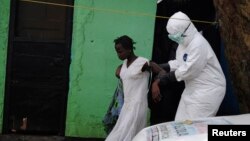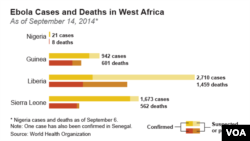More than half of all Ebola cases in West Africa have been adult women. But aid agencies say women are also the most affected by border closures and travel restrictions, as they carry out most of the commercial cross-border trade.
Activists say women's needs must be considered as authorities attempt to stop the Ebola epidemic.
The United Nations’ Entity for Gender Equality and the Empowerment of Women, better known as U.N. Women, said that women and girls account for more than 55 percent of reported Ebola cases in affected countries.
Larger part of death toll
In Liberia, up to 75 percent of those killed by Ebola have been women.
“This was not targeted at them, but it came as a result of the roles they were playing," explained Josephine Odera, the regional director for U.N. Women in West and Central Africa.
"In families, they are the ones responsible for taking care of the sick. In certain communities, they are the ones responsible for washing the corpses. They’re the ones responsible for dressing them," Odera said.
"So those kind of care roles for women in families and communities have put them at higher risk of exposure and many of them have thus found themselves dying," she added.
Women are also most likely to be nurses and the ones taking care of cleaning and laundry in the public health sector.
Border closures and travel restrictions are another challenge for women.
In Liberia, for example, women carry out an estimated 70 percent of cross-border trade.
“The closure of borders is doing more harm to the countries affected. … [Women] contribute to the informal sector more than men," noted Brahima Kaba, the Liberian ambassador to Senegal.
"So in this case, you prevent women from earning what they normally earn so they become poorer. It increases poverty among women and their families. … So African women across the board lose. It has a serious economic impact," Kaba said.
Multiple roles
U.N. Women said that food production is also suffering, as women account for the majority of small farmers in Liberia.
“If you look at markets being closed down, that is a major source of livelihood for women," Odera said. "I’m not saying markets shouldn’t be closed down, but measures should be taken to sanitize and to educate so that certain trade can still go on and women are not left impoverished.”
Musu Tarnue, the executive director for a Liberian women’s NGO, Women in Action, said it is time to reverse this trend.
“We think women should be taken into consideration when they are planning to fight against Ebola. ... And we are worried every day. So as a women’s organization, we are calling on the government and NGOs to design a special program to educate women about it," Tarnue said.
Tarnue added that such a program would include targeting women with messages about Ebola symptoms and prevention methods, helping women access safe markets and trading areas, and improving the economics of female-headed households affected by Ebola with savings and loan plans, and access to credit.
She said women also need to be given better access to appropriate safety gear, such as goggles, gloves and masks for use when caring for the sick.
Prince Collins contributed to this report from Monrovia





